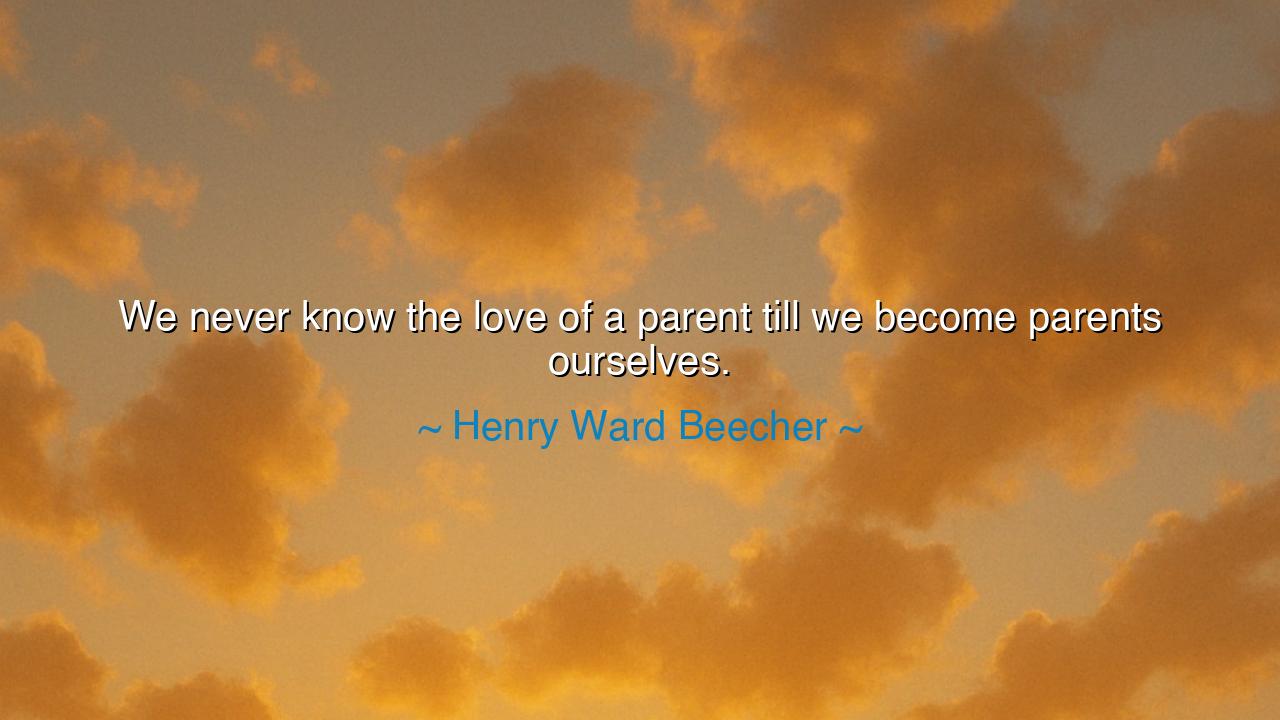
We never know the love of a parent till we become parents






In words rich with timeless tenderness, the great preacher Henry Ward Beecher once said: “We never know the love of a parent till we become parents ourselves.” Though simple in form, this saying carries the profound weight of human experience — for it reveals that love, in its truest and most selfless form, is often understood only through the act of giving, not receiving. Beecher, whose sermons and writings were filled with compassion and insight, understood that there are some truths the heart can only grasp through living — and none deeper than the sacrificial love of a parent.
The origin of this wisdom is found not in philosophy alone, but in the rhythm of life itself. For when we are children, love is something we expect, not something we measure. We see the care of our parents as ordinary, their sacrifices as invisible, their worry as unnecessary. The nights they spend awake, the labor they endure, the tears they hide — all pass before our eyes like wind through trees. But when the day comes that we, too, hold a child in our arms, trembling with both joy and fear, the truth dawns upon us like sunlight through a storm: that the love of a parent is endless, patient, and unconditional, and that it carries a weight no heart can understand until it bears it itself.
Henry Ward Beecher, born in the 19th century, was a man who believed in the divinity of human love. His life was devoted to awakening moral and spiritual awareness in an age of change. As a pastor, he spoke not only of faith, but of the human heart — of its struggles, its longings, and its capacity for growth. His reflection on parental love emerged from observing life’s great cycle: the child who receives, the parent who gives, and the adult who, in time, learns that love is not duty, but devotion. Beecher saw in parenthood a sacred mirror — one that reflects God’s own nature, for in giving life, nurturing it, and forgiving endlessly, a parent becomes a vessel of divine compassion.
Consider the story of Susanna Wesley, mother of John and Charles Wesley, founders of the Methodist movement. She bore nineteen children, many of whom she lost in infancy, yet her faith and love never faltered. In her tiny home, she taught each child to pray, to read, and to live with honor. Her sons, who would later move nations with their faith, always spoke of their mother’s strength and patience. But imagine her weariness, her quiet tears, her endless work — all unseen, all freely given. Only when they became shepherds to their own flocks did they understand the depth of her love, the daily sacrifice that had shaped their souls. Her life stands as a living testament to Beecher’s words: that only through the act of giving life and nurturing it do we fully grasp the immensity of love itself.
This truth also echoes through the teachings of every culture. In the East, the poet Tagore once wrote that “love is an endless mystery, for it has nothing else to explain it.” The mystery Beecher describes is of the same kind: the revelation that comes not from thought, but from experience. Parenthood strips away selfishness and reveals the heart’s truest form. The sleepless nights, the worries over safety and future, the quiet joys of watching a child’s first steps — these awaken an understanding that no lecture, no book, no sermon can teach. It is only when we give all of ourselves to another, without condition, that we comprehend what our parents once gave to us.
Yet, Beecher’s words also whisper a gentle admonition: that we should not wait until life forces us to understand love. We can awaken our gratitude now. We can pause, even before we have children of our own, to look upon our parents with new eyes — to recognize their human frailty, their courage, their silent endurance. For love is not perfect, and parents are not gods. They err, they struggle, they grow weary. But behind every mistake lies intention, and behind every harsh word, a hidden fear born of love. To see this truth early is to honor the invisible sacrifices that shaped us.
So, my dear listener, let this teaching settle in your heart: love that is given freely is the highest form of understanding. Do not take lightly the hands that once fed you, the hearts that once worried for you, the arms that once held you safe. If your parents still live, speak your gratitude; if they are gone, live in a way that honors their effort and their hope. And when the time comes that you hold a child of your own — whether by blood or by choice — remember Beecher’s words, and you will feel them living within you.
For in that moment, when you sacrifice sleep for a cry in the night, when you tremble for a child’s pain, when you find yourself loving beyond reason — then you will know, as Beecher knew, that the love of a parent is a sacred mystery: unseen until it becomes your own. And through that revelation, you will touch the eternal truth of the human heart — that love, in its purest form, is both the gift we receive and the gift we learn to give.






AAdministratorAdministrator
Welcome, honored guests. Please leave a comment, we will respond soon